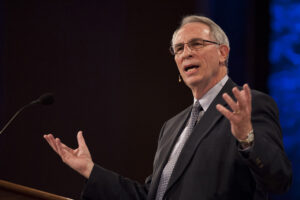
LOUISVILLE, Ky. (BP)–Jeff Struecker never asked to be famous.
Two days in Mogadishu, Somalia, though, forever changed his life. Those two days — Oct. 3-4, 1993 — will never be forgotten in United States military history. What began as a peacekeeping mission ended in a firefight.
Eighteen American soldiers died. Many others were injured. Somalis dragged the bodies of dead soldiers through the streets, and Americans witnessed it all on the evening news.
Struecker was there, recovering the bodies of his fallen brethren and rescuing his fellow soldiers.
And he came back to tell about it.
“I have never really been shaken up about Mogadishu — even after it was over,” said Struecker, a graduate of Southern Baptist Theological Seminary in Louisville, Ky.
“God just took care of all of those things for me.”
Nine years after that firefight, more and more people are learning about the heroism of Struecker and his fellow U.S. Army Rangers. The movie “Black Hawk Down” — rated R for excessive language and graphic violence — was released in January. Brian Van Holt plays Struecker’s character.
The History Channel broadcast a two-hour documentary, “The True Story of Black Hawk Down,” which includes several clips of an interview with Struecker. The documentary — which has graphic scenes and some language — will air again Feb. 2 at 8 a.m. (ET).
In light of the movie and documentary, Struecker has conducted more than 20 interviews with various media outlets, including ABC’s “Good Morning America.”
During each interview, Struecker shares his faith in Jesus Christ, telling the reporter — as well as the audience — what brought him through the battle.
“I tell people that I had a strong faith when I went there, but God really strengthened it while I was there and now I have a belief that transcends death,” he said. “Really, it’s a peace that God gave me that most soldiers didn’t have.”
Following the battle in Mogadishu, Struecker discovered that many of his fellow soldiers were searching for answers. The on-site chaplain, though, had none, and did little to assist the soldiers’ spiritual needs.
Struecker’s heart broke as he watched his friends agonize over their fallen comrades. Struecker may not have known it at the time, but God was preparing him for full-time ministry.
Today, Struecker is serving in Fort Bragg, N.C., as chaplain for a field artillery battalion in the 82nd Airborne. He is the pastor to roughly 500 soldiers and their families.
“I thank God for what he has allowed me to do as a result of the movie and the documentary,” he said. “I’ve had a chance to do a number of television interviews. … Inevitably, people will ask me, ‘Well, how did you end up as a chaplain?’ That presents an opportunity for me to share my faith.”
And if a question about his faith doesn’t come up, Struecker makes sure he broaches the subject.
“They’ll say, ‘Is there anything else you want to add?’ I’ll say, ‘Yes, absolutely. I want to tell you how I had the strength and the courage to do what I did that day.'”
Struecker has been pleasantly surprised with the coverage he has received. He initially believed that reporters would edit out references to his faith. However, that has not been the case. The History Channel documentary even includes a comment from Struecker about him praying.
“What has really blown me away has been the amount of press that has decided to cover my faith,” he said. “I thought, ‘Well surely they’ll edit all of that out.’ I thought even the History Channel would edit a lot of that out. But they decided to leave a comment in there about me going to the Lord in prayer, asking for strength.”
Struecker is just as open about his faith around his soldiers. The movie, coupled with the events of Sept. 11 — have presented him with opportunities he would never have had. Soldiers who might be sent to the Afghanistan region come to Struecker — simply because he has been in the heat of battle.
“I’ve had the privilege to stand before my men while the U.S. is conducting offensive actions against the Taliban in Afghanistan,” Struecker said, “and I could say, ‘Listen, this could be you, and it could be soon. And if you are not sure of your eternal destiny, then we need to talk.’ It gave me the opportunity to share my faith. Since then I’ve seen dozens of my soldiers come to Christ.
“… The privilege to be able to stand among that many non-believers is something that no other pastor has. To be able to do it in a time like today is a great privilege. I consider it a great responsibility.”
Struecker realizes that some Christians have concerns about evangelical chaplains — simply because they have to serve soldiers of all religions. He, though, does not view it as a problem.
“I have the responsibility to provide for the religious needs to all my soldiers,” he said. “… (But) all it means is that I need to make sure that they have what’s necessary to worship. Quite frankly, I’d want people to do the same for me.”
Among military personnel, the story of Black Hawk Down is well-known. Occasionally, soldiers will come up to Struecker, asking him if he’s the same Jeff Struecker who served in Somalia.
“I get that from a lot of my soldiers and from other soldiers who are not in my unit,” he said. “But that’s a great opportunity to tell people that all of these things that I did, they really don’t mean anything.
“God has given me this opportunity, and I need to make every effort I can to give him credit.”
Through it all, Struecker makes sure he’s not the focus of the story.
“I just pray that God will be made the hero of Mogadishu,” he said, “and not me.”
–30–













